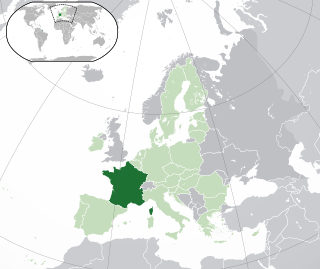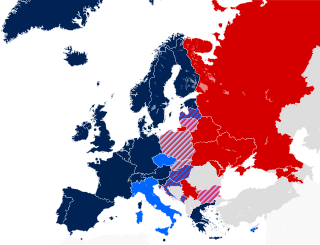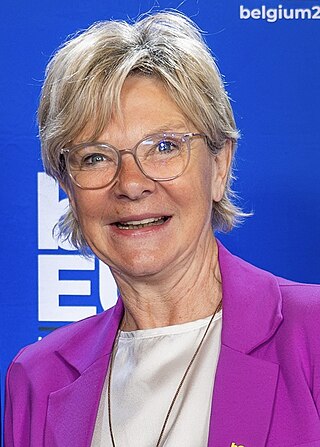
The national flag of Luxembourg consists of three horizontal stripes, watermelon red, white and light blue, and can be in 1:2 or 3:5 ratio. It was first used between 1845 and 1848 and officially adopted in 1993. It is informally called in the country, «rout, wäiß, blo».
Same-sex marriage has been legal in Belgium since 1 June 2003. A bill for the legalization of same-sex marriages was passed by the Senate on 28 November 2002, and by the Chamber of Representatives on 30 January 2003. King Albert II granted his assent, and the bill entered into force on 1 June. Polling indicates that a significant majority of Belgians support the legal recognition of same-sex marriage. Belgium was the second country in the world to legalise same-sex marriage, after the Netherlands.
Same-sex marriage has been legal in France since 18 May 2013, making France the thirteenth country in the world and the ninth in Europe to allow same-sex couples to marry. The legislation applies to metropolitan France as well as to all French overseas departments and territories. Polling suggests that a significant majority of French people support the legal recognition of same-sex marriage.

Remich is a commune with town status in south-eastern Luxembourg with a population of 3,645 inhabitants as of 2018. It is situated in the canton of the same name. Remich lies on the left bank of the river Moselle, which forms part of the border between Luxembourg and Germany. The commune is the smallest in Luxembourg by surface area.
Same-sex marriage has been legal in Switzerland since 1 July 2022. Legislation to open marriage to same-sex couples passed the Swiss Parliament in December 2020. The law was challenged in a referendum on 26 September 2021 by opponents of same-sex marriage and was approved with the support of 64% of voters and a majority in all 26 cantons. The law went into force on 1 July 2022. A provision of the law permitting same-sex marriages performed abroad to be recognised in Switzerland took effect on 1 January 2022. Switzerland was the seventeenth country in Europe and the 30th in the world to allow same-sex couples to marry.

Lesbian, gay, bisexual, transgender, and queer (LGBTQ) rights in France are some of the most progressive by world standards. Although same-sex sexual activity was a capital crime that often resulted in the death penalty during the Ancien Régime, all sodomy laws were repealed in 1791 during the French Revolution. However, a lesser-known indecent exposure law that often targeted LGBTQ people was introduced in 1960, before being repealed in 1980.

East is one of the four multi-member constituencies of the Chamber of Deputies, the national legislature of Luxembourg. The constituency was established in 1919 following the introduction of proportional representation for elections to the Chamber of Deputies. It consists of the cantons of Echternach, Grevenmacher and Remich. The constituency currently elects seven of the 60 members of the Chamber of Deputies using the open party-list proportional representation electoral system. At the 2023 general election it had 40,246 registered electors.

North is one of the four multi-member constituencies of the Chamber of Deputies, the national legislature of Luxembourg. The constituency was established in 1919 following the introduction of proportional representation for elections to the Chamber of Deputies. It consists of the cantons of Clervaux, Diekirch, Redange, Vianden and Wiltz. The constituency currently elects nine of the 60 members of the Chamber of Deputies using the open party-list proportional representation electoral system. At the 2023 general election it had 52,922 registered electors.

Lesbian, gay, bisexual, transgender, and queer (LGBTQ) people in Luxembourg have the same legal rights as non-LGBTQ people. Partnerships, which grant many of the benefits of marriage, have been recognised since 2004. In June 2014, the Luxembourgish Parliament passed a law enabling same-sex marriage and adoption rights, which took effect on 1 January 2015. Additionally, discrimination on the basis of sexual orientation and "change of sex" in employment, healthcare and the provision of goods and services is outlawed, and transgender people are allowed to change their legal gender on the basis of self-determination.

Lesbian, gay, bisexual, transgender, and queer (LGBTQ) rights in Switzerland are some of the most progressive by world standards. Social attitudes and the legal situation have liberalised at an increasing pace since the 1940s, in parallel to the situation in Europe and the Western world more generally. Legislation providing for same-sex marriage, same-sex adoption, and IVF access was accepted by 64% of voters in a referendum on 26 September 2021, and entered into force on 1 July 2022.

Lesbian, gay, bisexual, transgender, and queer (LGBTQ) rights are widely diverse in Europe per country. 22 of the 38 countries that have legalised same-sex marriage worldwide are situated in Europe. A further 11 European countries have legalised civil unions or other forms of recognition for same-sex couples.

Same-sex marriage is legal in the following countries: Andorra, Argentina, Australia, Austria, Belgium, Brazil, Canada, Chile, Colombia, Costa Rica, Cuba, Denmark, Ecuador, Estonia, Finland, France, Germany, Greece, Iceland, Ireland, Luxembourg, Malta, Mexico, the Netherlands, New Zealand, Norway, Portugal, Slovenia, South Africa, Spain, Sweden, Switzerland, Taiwan, the United Kingdom, the United States, and Uruguay.
The law opening marriage to same-sex couples, no. 2013-404 is a French law which, since 18 May 2013, grants same-sex couples the right to marry and jointly adopt children.
The Assembly of Estates was the legislature of Luxembourg from 1841 to 1848, and again from 1856 to 1868.

Adoption by LGBT people in Europe differs in legal recognition from country to country. Full joint adoption or step-child adoption or both is legal in 23 of the 56 European countries, and in all dependent territories.
Constantin-Joseph-Antoine Pescatore, known as Antoine Pescatore, was born on 16 December 1787 in Luxembourg City, and died on 31 October 1858 in Sandweiler. He was a businessman and politician.

Lex Delles is a Luxembourgish politician. He was mayor of Mondorf-les-Bains, Member of the Chamber of Deputies, he served as Minister for Small and Medium-Sized Enterprises and Minister for Tourism in the second Bettel Government and, from 17 November 2023 on, serves as Minister of Economy, SMEs and Engery and Tourism in the Frieden-Bettel Government.

De Roude Léiw is the common name used for the civil ensign of Luxembourg. It can also refer more specifically to the heraldic animal of Luxembourg, which is often used as an emblem or mascot for various institutions and symbols related to Luxembourg.

Barbara Agostino is a Luxembourgish politician from the DP. She is a member of the Chamber of Deputies and the Benelux Parliament.

Martine Hansen is a Luxembourgish agricultural economist and politician of the Christian Social People's Party who serves as Minister of Agriculture, Food and Viticulture and Minister for Consumer Protection in the Frieden-Bettel Government. She was a member of the Chamber of Deputies (2013–2023) and served as Minister for Higher Education and Research from April to December 2013 in the Juncker–Asselborn II Government.















